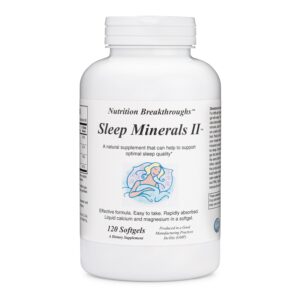Potassium and Calcium for Better Sleep
According to the National Sleep Foundation, almost six out of ten Americans report having insomnia and sleep problems at least a few nights a week.
There are some special sleep-inducing foods and minerals that have been shown to have a calming effect on restless sleep.
Some of the types of insomnia include sleep apnea, which involves interrupted breathing and snoring during the night; insomnia from hormone fluctuations such as with menstruation or menopause; restless leg syndrome, which causes sensations in the legs such as creeping, crawling, pulling, or pain; and insomnia from the use of medications, caffeine or alcohol.
Will potassium help sleep? Natural minerals such as potassium and calcium have been shown to have beneficial effects on the quality of sleep. One recent study from the Journal “Sleep” researched the effects of potassium supplements on sleep quality.
The researchers gathered data from wrist monitors and notes made in sleep diaries. Normal young males on a low-potassium diet participated in the study. After one week of taking potassium supplements, there were significant improvements in their quality of sleep and less waking up during the night.
How does potassium affect sleep? A deficiency of potassium can interfere with restful sleep due to the potential for stiff muscles or muscle spasms in the night. The blood needs to maintain a good balance between potassium and sodium (salt). Potassium is found abundantly in fresh vegetables and fruits, so these are a good focus as opposed to eating a lot of processed or packaged foods containing high sodium.
One of the healthiest, highest sources of potassium is the banana, which contains 400 milligrams. Eating a banana before bedtime may help reduce nighttime awakenings and provide a better, deeper sleep. A banana can also be eaten in the middle of the night to help one get back to sleep.
What are some other potassium-rich foods? Here is a list of some high-potassium foods, courtesy of the Linus Pauling Institute:
Potato, baked with skin, 1 medium, 926 mg
Plums, dried (prunes), 1/2 cup, 637 mg
Prune juice, 6 fluid ounces, 528 mg
Spinach, cooked, 1/2 cup, 420 mg
Banana, 1 medium, 400 mg
Orange juice, 6 fluid ounces, 372 mg
Tomato, 1 medium, 292 mg
Sunflower seeds, 1 ounce, 241 mg
Almonds, 1 ounce, 200 mg

Photo 65928535 © Airborne77 | Dreamstime.com
Calcium helps sleep? Yes, calcium is also directly related to our cycles of sleep. In one study, published in the European Neurology Journal, researchers found that calcium levels in the body are higher during some of the deepest levels of sleep, such as the rapid eye movement (REM) phase.
The study concluded that disturbances in sleep, especially the absence of REM deep sleep or disturbed REM sleep, are related to a calcium deficiency. Restoration to the normal course of sleep was achieved following the normalization of the blood calcium level.
William Sears, M.D. writes: “Calcium helps the brain use the amino acid tryptophan to manufacture the sleep-inducing substance melatonin. This explains why dairy products, which contain both tryptophan and calcium, are one of the top sleep-inducing foods.”
 One natural insomnia remedy showing good results is Sleep Minerals II from Nutrition Breakthroughs. This natural sleep aid contains powerful forms of calcium and magnesium, the best known minerals for relaxation and sleep, as well as for restless leg syndrome, stomach health, teenage insomnia, and menopause insomnia.
One natural insomnia remedy showing good results is Sleep Minerals II from Nutrition Breakthroughs. This natural sleep aid contains powerful forms of calcium and magnesium, the best known minerals for relaxation and sleep, as well as for restless leg syndrome, stomach health, teenage insomnia, and menopause insomnia.
The ingredients are formulated in a softgel with healthy oils, making them more quickly absorbable than tablets or capsules and providing a deeper, longer-lasting sleep.
Kimberly B. of Troy, Michigan says: “I have been taking Sleep Minerals II for about a month now. I have tried everything out there and this supplement is amazing. I have suffered with insomnia for 2 1/2 years. I have also had restless leg syndrome my entire life and this is the first relief I’ve ever had…gone for a month now.”
Make good use of natural minerals and sleep inducing foods as your first line of defense against insomnia. Calcium helps sleep and potassium is another supportive mineral.
For more information on Sleep Minerals II visit the sleep remedy page.
Natural minerals such as potassium and calcium have been shown to have beneficial effects on the quality of sleep. One recent study from the Journal “Sleep” researched the effects of potassium supplements on sleep quality. After one week of taking potassium supplements, there were significant improvements in the quality of sleep and less waking up during the night.
A deficiency of potassium can interfere with restful sleep due to the potential for stiff muscles or muscle spasms in the night. The blood needs to maintain a good balance between potassium and sodium (salt). Potassium is found abundantly in fresh vegetables and fruits, so these are a good focus as opposed to eating processed or packaged foods containing high sodium.
Here is a list of some high-potassium foods, courtesy of the Linus Pauling Institute:
Potato, baked with skin, 1 medium, 926 mg
Plums, dried (prunes), 1/2 cup, 637 mg
Prune juice, 6 fluid ounces, 528 mg
Spinach, cooked, 1/2 cup, 420 mg
Banana, 1 medium, 400 mg
Orange juice, 6 fluid ounces, 372 mg
Tomato, 1 medium, 292 mg
Sunflower seeds, 1 ounce, 241 mg
Almonds, 1 ounce, 200 mg
Calcium is also directly related to our cycles of sleep. In one study, published in the European Neurology Journal, researchers found that calcium levels in the body are higher during some of the deepest levels of sleep, such as the rapid eye movement (REM) phase. The study concluded that disturbances in sleep, especially the absence of REM deep sleep or disturbed REM sleep, are related to a calcium deficiency. Restoration to the normal course of sleep was achieved following the normalization of the blood calcium level.



